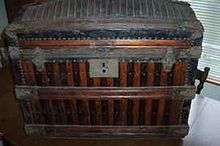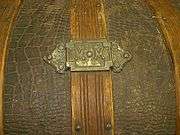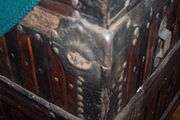Martin Maier
Martin Maier (January 20, 1840 – November 9, 1893) was founder and proprietor of Martin Maier Trunk and Bag Company (est. 1865), which specialized in making specialty and sample trunks. His company was one of the largest distributors of luggage and leather goods in the mid-west, based in Detroit at 55 Monroe Avenue, then moved to 102 Woodward Avenue in 1873.
Early life
Martin Maier was born January 20, 1840 in Langensteinbach (Baden). He learned the saddler's trade eventually becoming a master saddle maker. At age twenty-one, he immigrated to the United States from Baden, Germany, living with his sister in Monroe, Michigan. Later, he moved to burgeoning Detroit, where he would key up with the Wolfe Brothers in the trunk and saddlery business. From there, he moved to St. Louis when the Civil War would break out. He joined the Union around 1863-1865, and is believed to have participated in the March to the Sea Campaign from Atlanta. His profound knowledge in saddlery prompted him to fashion a saddle for General Tecumseh Sherman, which bolstered his aspiration to start a saddlery business. His job in the Army is relatively unknown, but he might have managed artillery because his section in History of Detroit states he "became quite deaf" due to the constant "roar of cannon" although the extent of his deafness is uncertain.
Trunk and Bag Company
After the war, he moved back to Detroit where he would marry Elizabeth Dorman on May 3, 1866, and have six children. Martin Maier & Co. was established when he helped coordinate an establishment with two friends. The trio built a business block on 55 Monroe Avenue, each occupying one-third of the block. The joint company specialized in a shoe store, and Maier managed a trunk and harness shop, until the business was burned out. Maier left the group and moved his business to 102 Woodward Avenue in 1873, where it would remain until his death. The high commercial integrity of Martin Maier & Co. was a result of an unbroken policy of fair treatment to patrons, the "practice of only dependable merchandize".[1] Before his business flourished, he contracted the manufacture of trunk parts that were made elsewhere, which was usually the case for many beginning trunk companies. But his company prospered so that Maier expanded the business to a four-story block on Twelfth Street, between Port and Abbott streets, where his trunks would be constructed entirely. Maier was prolific in producing patented designs that would make his trunks have a unique style. A distinguishing high-quality feature was the issuing of uniquely built oak slat trunks. On much of his trunks, two M's would be stamped in pieces of the metal hardware, particularly his dome-tops. Maier was a devout Lutheran, and a member of the Grand Army of the Republic. He was also a Republican, but avoided politics as to keep to the integrity of his business and maintain a bipartisan profile for the sake of some of his patrons.
Death and Legacy
On November 9, 1893, he died and was buried in Woodmere cemetery. After his death, his wife took over presidency of the trunk company, but rented it to the Scotten Tobacco Company. Later, she would give proprietorship to Frederick Paquette, who had previously worked for the MM Company at the age of sixteen.[2]
Gallery
| Examples of Martin Maier's Trunks | ||||||
|---|---|---|---|---|---|---|
|
See also
- Trunk (luggage)
- M. M. Secor, a famous trunk maker in Racine, Wisconsin.
References
- ↑ History of Detroit , p. 929, by Paul Leake (1908)
- ↑ City of Detroit, p. 379, by Clarence Monroe Burton, William Stocking, and Gordon K. Miller (1922)


